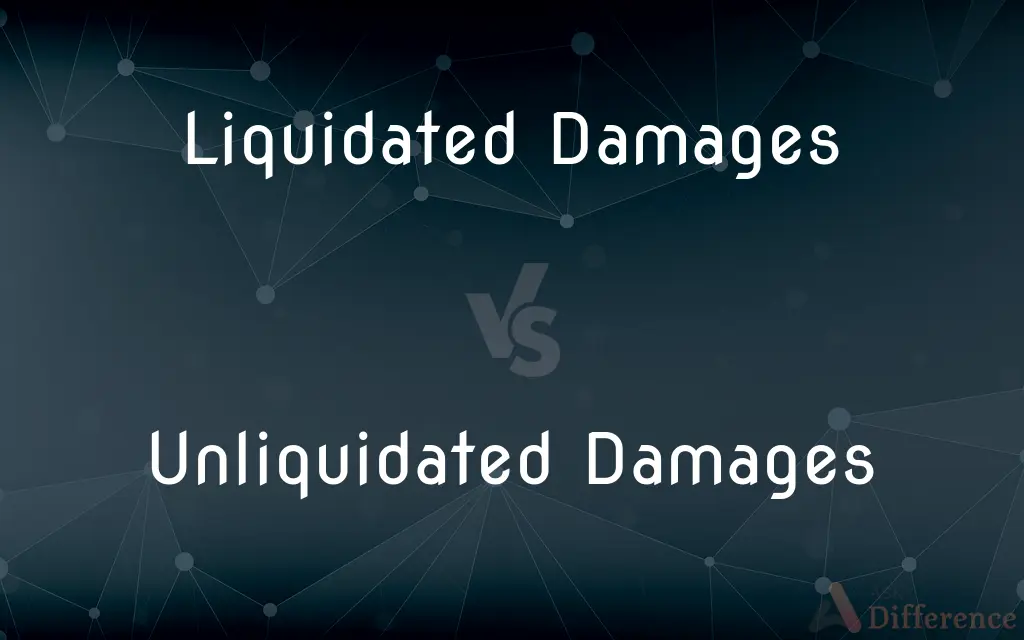Liquidated Damages vs. Unliquidated Damages — What's the Difference?
Edited by Tayyaba Rehman — By Fiza Rafique — Published on December 4, 2023
Liquidated Damages are predetermined compensation amounts for a breach, while Unliquidated Damages are unspecified and determined after the breach.

Difference Between Liquidated Damages and Unliquidated Damages
Table of Contents
ADVERTISEMENT
Key Differences
Liquidated Damages represent a pre-agreed amount to be paid upon a contract breach, ensuring both parties have clarity from the outset. Conversely, Unliquidated Damages don't have a preset value, and their determination depends on the actual harm sustained.
In contracts, Liquidated Damages serve as a protective measure, stipulating a fixed sum in advance. Unliquidated Damages, however, are ascertained after the event, often requiring assessment to quantify the loss.
Parties choose Liquidated Damages for predictability, setting a clear consequence for contract violations. Unliquidated Damages involve more uncertainty, as they hinge on after-the-fact evaluations.
Liquidated Damages can expedite dispute resolutions since the damages are pre-defined. In contrast, Unliquidated Damages might necessitate longer deliberation or court involvement to settle the amount.
Comparison Chart
Determination
Pre-agreed upon
Assessed post-breach
ADVERTISEMENT
Purpose
Predictability and clarity
Compensation based on actual harm
Contractual Inclusion
Specified in contracts
Not predefined in contracts
Dispute Resolution
Often quicker due to preset amounts
May require lengthy evaluations or court proceedings
Reliability
Fixed and known
Variable and dependent on individual circumstances
Compare with Definitions
Liquidated Damages
Predefined compensation for a contract breach.
The contract imposed $10,000 in Liquidated Damages for any delays.
Unliquidated Damages
Compensation determined after a breach occurs.
The plaintiff sought Unliquidated Damages after the accident.
Liquidated Damages
An agreed-upon sum for specific contract violations.
Liquidated Damages were set to ensure timely project completion.
Unliquidated Damages
Damages assessed based on actual loss.
The court awarded her Unliquidated Damages for her suffering.
Liquidated Damages
A fixed amount parties accept as compensation.
To avoid future disputes, they set Liquidated Damages in the contract.
Unliquidated Damages
Amounts not predetermined in a contract.
The contract lacked a fixed sum, leading to a claim for Unliquidated Damages.
Liquidated Damages
A predetermined penalty for non-performance.
The builder faced Liquidated Damages if the project wasn't completed on time.
Unliquidated Damages
Damages based on post-event evaluations.
Their claim for Unliquidated Damages required an assessment of actual harm.
Liquidated Damages
A contractual provision specifying breach penalties.
The Liquidated Damages clause clarified the repercussions of a delay.
Unliquidated Damages
An unspecified compensation amount for harm.
Unliquidated Damages were claimed as the loss wasn't predefined.
Common Curiosities
Why might parties choose Liquidated Damages over Unliquidated Damages?
For clarity, predictability, and often a swifter dispute resolution.
Are Liquidated Damages always enforceable in court?
No, they can be challenged if seen as a penalty rather than a fair estimate of potential loss.
Are Unliquidated Damages always higher than Liquidated Damages?
Not necessarily. Unliquidated Damages are based on actual loss, which might be higher, lower, or equal to Liquidated Damages.
Can Unliquidated Damages be awarded without a specific clause in a contract?
Yes, they are typically based on actual harm and don't require a specific clause.
Why are Liquidated Damages included in contracts?
To provide clarity and predictability regarding potential breach consequences.
Are Unliquidated Damages subjective?
They can be, as they're based on post-breach assessments of actual harm.
Can parties negotiate Unliquidated Damages after a breach?
Yes, parties can negotiate to reach an agreement without court involvement.
Can a contract have both Liquidated and Unliquidated Damages?
Yes, some contracts may stipulate Liquidated Damages for certain breaches and leave others to Unliquidated Damages.
What happens if Liquidated Damages are seen as excessive?
Courts may rule them unenforceable if they're deemed a penalty rather than a fair damage estimate.
How are Unliquidated Damages determined?
Through evaluations, negotiations, or court rulings based on actual harm or loss.
Share Your Discovery

Previous Comparison
Retina Display vs. Regular Display
Next Comparison
Cisco GLC-LH-SM vs. Cisco GLC-LH-SMDAuthor Spotlight
Written by
Fiza RafiqueFiza Rafique is a skilled content writer at AskDifference.com, where she meticulously refines and enhances written pieces. Drawing from her vast editorial expertise, Fiza ensures clarity, accuracy, and precision in every article. Passionate about language, she continually seeks to elevate the quality of content for readers worldwide.
Edited by
Tayyaba RehmanTayyaba Rehman is a distinguished writer, currently serving as a primary contributor to askdifference.com. As a researcher in semantics and etymology, Tayyaba's passion for the complexity of languages and their distinctions has found a perfect home on the platform. Tayyaba delves into the intricacies of language, distinguishing between commonly confused words and phrases, thereby providing clarity for readers worldwide.
















































